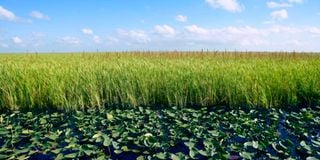Humanity has no option but to save wetlands

Besides helping to replenish the groundwater table, wetlands also play a vital role in purifying water.
What you need to know:
- A wetland is a place where the soil is swampy, water is always standing on the ground.
- Birds and animals live also here, making a significant contribution to human life.
The Ramsar Convention on Wetlands was signed on this day in 1971 in Ramsar, Iran. It gave special status to wetlands and encouraged the identification of important wetlands in all countries in order to save this habitat of aquatic animals, plants and birds. Hence, the World Wetlands Day.
Observed every February 2, the day commemorates the impact and beneficial productivity that wetlands have had on the globe and the importance of bringing people together for the benefit of Mother Nature. The theme of this year’s event, ‘Wetlands Action for People and Nature’, aims to highlight the importance of actions to conserve and sustain wetlands.
A wetland is a place where the soil is swampy, water is always standing on the ground, whether a dam permanently or temporarily blocks natural or flowing water. The wetland is — you guessed right — always wet. The amount of water in the wetlands keeps increasing. Besides helping to replenish the groundwater table, wetlands also play a vital role in purifying water.
Kidneys of the earth
Birds and animals live also here, making a significant contribution to human life. Wetlands are rich places in terms of biodiversity. A variety of beneficial herbs are found in the vicinity of wetlands. Guest migratory birds, from foreign countries, come in large numbers every year.
But wetlands are in danger of unnatural human activity. The cause of it is extreme pollution, flooding of reservoirs, growing population, urbanisation, industrialisation and human greed.
The depth of wetlands is decreasing due to silt brought by rainwater. Wetlands are being used by farmers as land. Water hyacinth, a burning plant that spreads very fast, is a threat to water resources. Polluted water is damaging wetlands due to industrial development.
If plants are the lungs of the earth, then wetlands are its kidneys. They play an important role in maintaining balance in nature. With 80 per cent of Kenya arid or semi-arid, we have no option but to save our wetlands from extinction.
Mr Surjit is a veteran journalist and freelance writer based in Brampton, Canada. [email protected]





